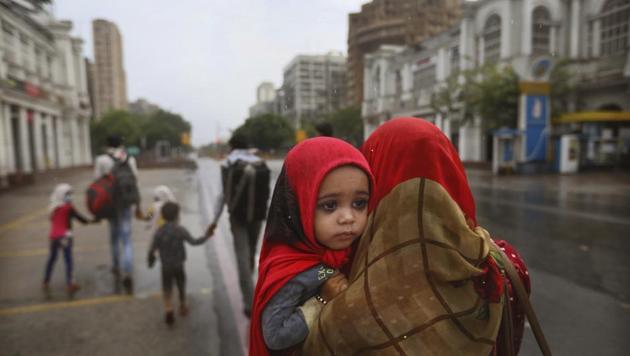Lockdown made Delhi’s poor poorer, but led to behavioural change, say researchers
Nine out of 10 respondents reported they weren’t smoking but it hasn’t been assessed whether most of them are non-smokers or quit smoking because of the Covid-19 crisis.
Mask usage in Delhi’s slum clusters quadrupled, frequent hand-washing became nearly universal and time spent indoors doubled compared to the pre-Covid-19 period, according to a working paper on behavioural change and job loss during the lockdown.

Nine out of 10 respondents reported they weren’t smoking but it hasn’t been assessed whether most of them are non-smokers or quit smoking because of the Covid-19 crisis.
The findings of the working paper, by researchers at the Energy Policy Institute of the University of Chicago and the University of British Columbia, are based on a survey of 1,392 respondents in Delhi’s slum clusters engaged in different professions, including construction workers, drivers, salaried workers, skilled labourers, domestic workers, and street vendors.
The impact of the lockdown on their income and employment has been unprecedented, the researchers found.
Their weekly income dropped by 57% on an average, as working days were reduced by 73%. By early May, weekly income had fallen to zero for nine out of 10 of the respondents. Around 35% of the sample reported accessing Delhi government’s food assistance programme.
The Delhi government set up more than 500 assistance centres across the city to provide food (rice and dal) to those who needed it. These centres appear to have been well placed, as the average distance between individuals in the sample and the nearest government assistance centre is only 640 metres, researchers found.
The same team of researchers were studying the impact of air pollution on residents in slum clusters for the past 1.5 years, which is why they had pre-Covid-19 data for preventive measures such as wearing masks.
During the first week of November last year, the Delhi government distributed five million masks to help people defend themselves against PM 2.5 (fine, respirable pollution particles), concentrations of which often surpassed 300 micrograms per cubic metres, which is 30 times higher than the WHO standard.
Researchers found mask usage had increased in the weeks following the government’s distribution of masks but it did not reach 35% of the sample. In contrast, it has become nearly universal during the Covid-19.
“If we want to understand what came out of the lockdown, one potential benefit is behaviour change. But we have to see if people can continue this for at least a couple of years till a vaccine or treatment is available,” said Ken Lee, executive director of the Energy Policy Institute at the University of Chicago in India (EPIC India) and the lead author of the study..
“The impact of the lockdown on people’s incomes has been massive. About 35% of the sample reported accessing food assistance, which is quite high because you would assume that many will not need food assistance. Our sample mainly consisted of people who earned on average Rs 3,000 a week. But this highlights that food assistance mitigated a crisis. The Delhi government should scale up this scheme.”
The paper found these behavioural changes were mainly driven by extreme fear and widespread media coverage of the Covid-19 pandemic.
Researchers used Facebook mobility data to find that intra-city movement dropped by 80%, immediately following the Janata curfew till May.
Compliance with public health directives will decide how cities can gradually emerge out of lockdowns.
“Future decisions to implement extreme social distancing mandates will involve complex trade-offs between the costs of higher infection rates in a world that remains open, and the economic and non-economic costs in one that is periodically closed. A key factor influencing this trade-off is the extent to which people follow the public health directives,” the paper concluded.
Dileep Mavlankar, director of the Indian Institute of Public Health in Gandhi Nagar, said: “Behaviour change cannot be sustained with hunger, so that needs to be addressed. Also, most workplaces like shops and restaurants do not provide toilet or other facilities to staff.
“Work places have to provide masks, water and soap for hand-washing. Alcohol is very expensive. Also, in behavioural science, there is the ABC theory which stand for antecedents, belief and consequences. So the behaviour change needs to be reinforced through consequences like congratulating the person for wearing a mask and hand-washing or negative feedback for not doing so.”
Banita Paik, a domestic worker who lives in Tughlakabad village, which is a containment zone, said, “All of us (family of four) bought masks from a medical store immediately after the lockdown began. We are washing hands regularly and not interacting as much with neighbours, but loss of income is a huge concern, even more than Covid-19 right now.”

Stay updated with all top Cities including, Bengaluru, Delhi, Mumbai and more across India. Stay informed on the latest happenings in World News along with Delhi Election 2025 and Delhi Election Result 2025 Live, New Delhi Election Result Live, Kalkaji Election Result Live at Hindustan Times.
Stay updated with all top Cities including, Bengaluru, Delhi, Mumbai and more across India. Stay informed on the latest happenings in World News along with Delhi Election 2025 and Delhi Election Result 2025 Live, New Delhi Election Result Live, Kalkaji Election Result Live at Hindustan Times.





